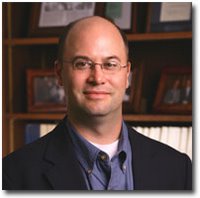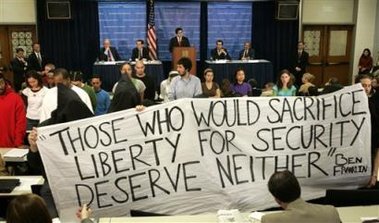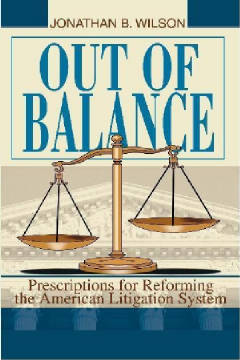
Is everybody ready for another exciting day before the
Judiciary Committee? Yeah, I'm not sure I am either. But I'll try to provide some updated recaps throughout the day. Since they are underway, let's get started ...
Round 3: LeahyLeahy is first up today, with 25 minutes. Leahy wants to talk about executing innocent people. Alito indicates that he is against such a thing and suggests that the Constitutional framework is designed to help doing everything possible to avoid having it happen.
Continuing with his death-theme, Leahy next asks about physician-assisted-suicide. Leahy criticizes the actions of Congress in the Schiavo case. Alito talks about common-law rights to refuse medical treatment and indicates that such common law has been around "for a long time."
Leahy tries to bait Alito on the issue of Congressional actions to "strip" jurisdiction from federal courts in various types of cases. Alito doesn't take the bait and indicates that he has not considered whether Congress can do that, and also notes that there is disagreement amongst scholars on the subject.
Round 3: KennedyKennedy starts off on executive power again. Then moves on to Vanguard (again). Alito (again) can't really remember whether Vanguard was on various recusal lists, and judges invest in mutual funds because they rarely present conflicts, etc. Kennedy is "confused" by the various excuses that Alito has offered for failing to recuse himself after promising to do so and Kennedy thinks this is a serious issue. Alito counters that he's being as forthcoming as possible, that he took great steps to avoid ethical problems, and says he has not given conflicting answers.
Kennedy decides to finish up by listing reasons he won't support Alito: executive power, women's rights, the little guy, inconsistent answers, etc.
Round 3: HatchHatch is up next. Hatch argues that Vanguard and CAP are both meaningless at this point. Points out that there was no law requiring recusal in Vanguard. Even asks Alito if he's "lived up to [his] word" (and Alito says, "yes"). Hatch also suggests Alito has answered more questions than any other nominee and argues that the way Alito is being treated will make others not want to serve.
Round 3: BidenBiden has 20 minutes. Biden starts off questioning about presidential power. Some questions about whether the President can declare war without Congress and whether Congress is limited only to appropriations limitations, etc. Alito basically says it's a complicated issue, subject of great debate, that he'd have to study it if the case came before him, etc.
Biden moves on to ask about stare decisis. Alito explains the differences between vertical and horizontal stare decisis and explains that even though horizontal is not mandated, it is presumed that courts will follow their own precedent. Although it is not forbidden to overrule prior cases like Roe, there has to be a good reason to overrule people's reliance on those cases.
Round 3: KohlKohl asks about term and age limits on judges. Alito hasn't really thought about whether it's a good idea or not. He does think it'd be a good idea to look to foreign countries and see how they do it (I'm sure he means as long as we don't look at their "laws" on the subject for guidance).
On to talk about Kelo. Alito acknowledges that eminent domain is a touchy issue. He won't comment on the decision itself.
Kohl asks how O'Connor will be remembered. Alito says with great admiration. He'll try to emulate her work ethic, etc. Kohl wants Alito to say he'll be a centrist judge like O'Connor was, and Alito will only say that he'll emulate O'Connor's work habits and that you'd have to look at his record as a judge to see what kind of a justice he'll be.
...RECESS!!...
DURING THE RECESS: Leahy and Schumer are addressing the press and lamenting Alito's failure to answer specific questions and distance himself from controversial comments in his past about women's rights, etc. Further, because the radicals who ended Harriet Miers' nomination support Alito, everyone should be wary.
...END RECESS...
Round 3: KylKyl reserves his time.
Round 3: FeinsteinFeinstein asks about presidential power and specifically gets into FISA / eavesdropping. Feinstein wants to know if the President was acting within his plenary powers in authorizing eavesdropping that was not indicated in the Congressional resolutions. Alito answers that it's a matter of statutory interpretation, that if the issue came before him that's how he would approach it.
Feinstein then starts asking Alito about odometer fraud. Yeah, odometer fraud. Apparently she's getting to commerce clause issues. Alito basically tells her that both the state and federal government have roles to play in protecting citizens.
Round 3: GrassleyGrassley suggests that Alito appears to have the judicial temperance to keep his (possibly) crazy personal poly sci theories about government out of his rulings. Alito agrees (not with the possibility of his personal theories being crazy, but with the idea that he'll follow the rule of law and not his personal ideologies).
Grassley then brings up a subject that he has no question at all about, just to tell Alito it would be an interesting thing for him to study in his spare time: The Federal False Claims Act.
Round 3: FeingoldFeingold wants to return to presidential power (because we haven't beat around the Bush -pun intended- enough on that one yet). Feingold asks about whether the president can violate a constitutional statute if it involves constitutional powers of the president. Or something like that. Alito basically says that the Constitution trumps statutes, that it would involve weighing the powers involved, ebbs of presidential power, and depends on the specifics to give a real answer.
Feingold moves on to revisit execution of innocent people. He wants to know if a person has a constitutional right not to be exectued based on actual innocence if all procedural methods were perfect but the person is still convicted and sentenced to die. Alito says there are procedures to prevent that and they would have to be followed.
Feingold notes that a group of federal judges are appearing on his behalf, and asks Alito if he will have to recuse himself from any of their cases in the future if they appear on his behalf. Alito has not thought about it. (But seems to be thinking, "I could always promise to do so in the 'initial phase' and then conveniently forget later, especially if there's no actual conflict.")
Round 3: SchumerFourth Amendment hypothetical: If the president has the power to engage in warrantless wiretaps, can he also search homes without a warrant? Alito says it depends on why a court would find the right to wiretap without a warrant. Might play out differently for wiretaps and home searches. (He doesn't point out that every second year law student learns that home searches are the most protected of all and certainly would require different scrutiny that eavesdropping on cell phones.)
Schumer then picks two cases out of Alito's thousands. He asks why Alito in one case voted against allowing a plaintiff (a mentally retarded one) from raising an issue that wasn't properly raised below but, in the other case, voted to allow the government to do precisely that. Alito tries to explain why the two issues were different, but Schumer doesn't buy it.
Schumer then tries to get into Alito's opinions on constructionism. Asks a hypothetical about whether a law could be passed that would strip people born in the US of citizenship if parents are here illegally, when Constitution clearly says anyone born in US is a citizen. Alito says he can't comment because there is such a bill currently pending. Schumer gets frustrated that Alito won't answer such a "simple" question. Alito replies, again, that it doesn't matter how simple it is, it's inappropriate for him to answer while there is such an issue pending.
After asking a couple of federalism questions, Schumer wraps up by indicating that he is disturbed by Alito's record and judicial philosophy. Alito's record is one siding with executive power, economic power, and against the "little guy." Alito's answers have not been illuminating. It will be hard to vote for him, but thanks anyway.
Round 3: SessionsNot much of significance (even by the standards of what I've reported so far). One really "hardball" question though, from Sessions. Sessions asks Alito if there are only three branches of government. After considering the question carefully, Alito answers that there are, indeed, only three. Regis Philbin then asks Alito if that is his "final" answer. (ok, so that last bit didn't happen, but you get the idea).
Round 3: DurbinDurbin asks about jurisdriction stripping (which he doesn't like), asks about the strip-search of the little girl case, and asks about immigration cases. Alito explains his position on the strip search case, and explains that he approaches immigration cases by following the rules and deferring to the immigration judges on factual and credibility determinations. Alito suggests the problems with the immigration system are problems for Congress, not for judges.
Round 3: LeahyI actually missed Leahy's questioning. But I'm guessing he expressed some dismay about Alito's views on executive power.
END OF ROUND 3!!! The Committee is going into executive session, and I believe this afternoon will bring testimony from witnesses. Stay tuned.
--------
Afternoon Session: Testimony of witnesses
ABA WitnessesFirst up this afternoon are the "neutral" ABA witnesses: Steve Tober, Marna Tucker, John Payton.
Tober explains what the ABA does in rating candidates. They look at integrity, competence, temperament, qualifications. In investigating Alito, over 2000 people were contacted -- judges, lawyers, lay people; additionally, Alito's opinions, briefs, and other writings were reviewed; finally, a personal interview of Alito was conducted. The ABA committee unanimously gave Alito a "well qualified" rating. In response to a question from Specter, Tober explains that the committee found that Alito is "even-handed" in his application of the law based on interviews with people and reviewing his writings. He acknowledges that the committee was inconclusive about whether Alito favors the government in decisions.
Payton answers a question from Specter about Vanguard. Payton says that Alito acknowledged that it was a mistake for him to hear the cases, the committee did not feel it reflected poor integrity, that Alito's integrity is held in high regard by the judges interviewed, and the committee concluded it was just a mistake.
Tucker handles a question about Alito and CAP. She indicates the commitee was concerned about CAP, and they looked into the matter. Alito gave them the same answers he gave in these hearings (not remembering much of anything). But she indicates that everyone they talked to saw no bigotry or prejudice in Alito and that everyone was surprised about his membership in CAP.
A few more questions of these panel members on the same basic issues; not much else really accomplished or revealed.
The ABA Panel is dismissed.
Panel of Judges For AlitoNext up is a panel of judges: Becker, Scirica, Berry, Aldisert, Garth, Gibbons, Lewis. All are current or former Circuit Court of Appeals judges who were invited by Specter.
Becker speaks to Alito's temperament, intellect, integrity, and approach to the law. Alito never raises his voice in conferences. Alito was not required to recuse from Vanguard by law. Alito has the intellect to sit on the SCOTUS and is a practical judge. Alito decides every case on its merits, not based on his personal views. Alito adheres to precedent. Alito decides cases as narrowly as possible.
Scirica believes Alito is ethical and deeply respects the law. Alito demonstrates compassion and temperament necessary to be an outstanding judge. Alito approaches every case with an open mind and respects precedent.
Berry has known Alito since 1977. She agrees with every glowing statement made about Alito. Alito was a skilled attorney and his level of work was contagious in the office. Alito is fundamentally decent.
Aldisert says that Alito's opinions show that he believes cases are dictated by their facts. Aldisert argues that political loyalties go out the window when people become judges. Alito's political loyalties from his early career are incompatible with judicial independence, and Alito's record shows judicial independence. In a nice touch, Aldisert quotes O'Connor about how judges must stay close to the record to mediate conflicting impulses and comments that the statement accurately describes Alito's work.
Garth has known Alito the longest because Alito clerked for Garth in 1976 and 1977. Garth rates Alito a 10+ on a scale of 1-10 (at least he didn't say 11?). Even when they disagree, he always respects Alito's opinions. Alito is a sound jurist with respect for the institution and he does not let himself get influenced by his personal opinions. Alito is led by the Constitution. Alito has respect for stare decisis (in case anybody didn't hear Alito say "stare decisis" approximately one million times in the past three days). He's qualified.
Gibbons also makes the case that becoming a judge transforms people from partisal political loyalties, regardless of the role those loyalties play in appointment. Good judges put that aside and become magically impartial and unswaying once they get their robes. As a result, what Alito may have said or done before getting robed should not play a role in the Senator's votes. (loosely translated: NOW he's fair and impartial and not a bigot and well qualified, and that should be good enough.) Gibbons even takes a shot at Congress by saying he thinks Alito would give the current detainee cases thoughtful consideration and that he can't say the same for Congress. Gibbons also defended Alito's dissent on Casey and the fact that the SCOTUS had not yet clarified the rules, allowing reasonable judges to disagree at the time.
Lewis is the last of this group. Lewis makes it known that he is by far the most liberal of the judges to speak on Alito's behalf. Lewis is very pro-choice and pro-civil rights, and is involved in many endeavors that would seem contrary to Alito's nomination. But he is testifying on Alito's behalf because of his respect for Alito's intellectual honesty. Lewis commends Alito for his principles and his respectful disagreement when the panel did not agree on decisions. He thinks Alito is qualified.
Specter is now going to ask some tough questions of these pro-Alito judges. Like whether they think Alito's personal views will influence his decisions on SCOTUS. Nevermind that they've all already said no, it's always a good idea to explicitly ask them and get the sound-byte answer that everyone already expects anyway. (by the way, the answer Specter gets to that question, asked of Judge Becker, is that "no" he doesn't think Alito will let his personal views influence his decisions -- shocking, I know). I won't recount all of the specifics.. it's just stuff like, do you (Alito supporter) want to say anything bad at all about Alito's attitude toward women or the little guy or his ethical standards? And each judge asked will then, as they have already done once, repeat that they have no reservations about Alito, that Alito is a shining star among the shining stars of the federal judiciary, etc. etc. ad nauseum. I'm sure you all get the picture here.
Feinstein is also asking questions now. Judge Becker is trying to get her to understand that the nature of appellate courts is such that 85 percent of cases that are heard by the appellate court are affirmed, so you can't just look at statistics of who "won" or "lost" on appeal to declare Alito against the "little guy." Judge Barry tries to explain standards of review to Feinstein.
The other Senators are also asking questions of the panel. Unfortunately, I have a meeting again this afternoon and won't be able to watch and/or report on the specifics. I'll try to read the transcripts later on and I'll post any specifics that are interesting. There may not be any. I expect that the Senators will ask these judges about the same things they either already have or that they asked Alito about, and these judges (being pro-Alito judges, afterall) will say they have no qualms about Alito's abilities, qualifications, or integrity. There will be more detail, of course, but that will be the generally idea of what will happen. If one of them surprisingly says something negative or controversial, I'll definitely post an update. Otherwise, check out the links right below here for ongoing coverage.
...ok... a little "ex post facto" recap of what happened after the "Pro-Alito" judges' panel yesterday:
Mixed Panel #1After the Pro-Alito judges, the first panel of witnesses who were both for and against Alito appeared. The panel consisted of: Edna Alexrod, former Chief of the Appeals Division in the USA office; Michael Gerhardt, con law professor from UNC Law School; Peter Kirsanow of the US Commission on Civil Rights, Sam Issacharoff, professor from the NYU Law School; Carter Phillips, attorney and former colleague in the Solicitor General's office; and Goodwin Lieu, professor from Cal Law School.
Of those witnesses Alexrod, Kirsanow, and Phillips were Pro-Alito. They generally indicated that he is not an idealogue, that his political affiliations were not evident, and he's not out of the mainstream. They also defended specific rulings of Alito as showing deference to precedent.
Gerhardt, Issacharoff, and Lieu were Anti-Alito. They focused on the necessity and the propriety of hard questions and the process and argued that Alito's record shows him siding with government and against individual rights.
Eventually Specter decided that they were not "at their best" any longer and recessed for the night. More panels on Friday.
....
Resources for today:
Washington Post (Transcript of January 12 hearing)
Washington Post Supreme Court Blog (Updated after each Senator)
SCOTUS Blog (liveblogging)
Sam Alito Blog (liveblogging)




































